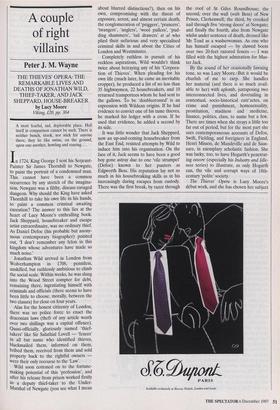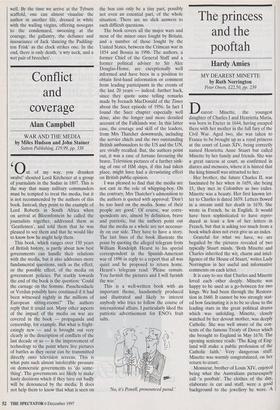A couple of right villains
Peter J. M. Wayne
THE THIEVES' OPERA: THE REMARKABLE LIVES AND DEATHS OF JONATHAN WILD, THIEF-TAKER, AND JACK SHEPPARD, HOUSE-BREAKER by Lucy Moore Viking £20, pp. 304
A most fearful, sad, deplorable place. Hell itself in comparison cannot be such. There is neither bench, stook, nor stick for anyone there; they lie like swine, on the ground, upon one another, howling and roaring ...
In 1724, King George I sent his Serjeant- Painter Sir James Thornhill to Newgate, to paint the portrait of a condemned man. This cannot have been a common occurrence by any stretch of the imagina- tion. Newgate was a filthy, disease-ravaged dungeon. Why should the King have asked Thornhill to take his own life in his hands, to paint a common criminal awaiting execution? The answer to this lies at the heart of Lucy Moore's enthralling book. Jack Sheppard, housebreaker and escape artist extraordinaire, was no ordinary thief. As Daniel Defoe (his probable but anony- mous contemporary biographer) pointed out, 'I don't remember any felon in this kingdom whose adventures have made so much noise.'
Jonathan Wild arrived in London from Wolverhampton in 1708, penniless, unskilled, but ruthlessly ambitious to climb the social scale. Within weeks, he was slung into the Wood Street compter for debt, remaining there, ingratiating himself with criminals and officials (there seems to have been little to choose, morally, between the two classes) for close on four years. Alas for the honest citizenry of London, there was no police force to enact the draconian laws (theft of any article worth over two shillings was a capital offence). Quasi-officially, gloriously named 'thief- takers' like Sir Salathial Lovell — 'fences' in all but name who identified thieves, blackmailed them, informed on them, bribed them, received from them and sold property back to the rightful owners were their only recourse to the 'Law'. Wild soon cottoned on to the fortune- making potential of this 'profession', and after his release from prison worked firstly as a deputy thief-taker to the Under- Marshal of Newgate (you see what I mean about blurred distinctions?), then on his own, compromising with the threat of exposure, arrest, and almost certain death, the conglomeration of 'priggers', 'prancers', `twangers', 'anglers', 'wool pullers', 'pud- ding shammers', 'tail drawers' et al who plied their nefarious and very specialised criminal skills in and about the Cities of London and Westminster.
Completely ruthless in pursuit of his reckless aspirations, Wild wouldn't think twice about betraying any of his 'Corpora- tion of Thieves'. When pleading for his own life (much later, he came an inevitable cropper), he produced a list of no less than 35 highwaymen, 22 housebreakers, and 10 returned transportees whom he had sent to the gallows. To be `doublecrossed' is an expression with Wildean origins. If he had evidence to convict one of his tame thieves, he marked his ledger with a cross. If he used that evidence, he added a second by its side.
It was little wonder that Jack Sheppard, now an up-and-coming housebreaker from the East End, resisted attempts by Wild to induce him into his organisation. On the face of it, Jack seems to have been a good boy gone astray due to one 'vile strumpet' (Defoe) known to her punters as Edgworth Bess. His reputation lay not so much in his housebreaking skills as in his increasingly daring escapes from custody. There was the first break, by razor through the roof of St Giles Roundhouse; the second, over the wall (with Bess) of New Prison, Clerkenwell; the third, by crooked nail through five 'strong doors' at Newgate; and finally the fourth, also from Newgate whilst under sentence of death, dressed like Mr Toad as a washerwoman. As one who has himself escaped — by clawed boots over two 20-feet razored fences — I was filled with the highest admiration for Mas- ter Jack.
By the sound of her ocasionally fawning tone, so was Lucy Moore.-But it would be churlish of me to carp. She handles her material (and there is so much avail- able to her) with aplomb, juxtaposing two interconnected lives, and dovetailing in contextual, socio-historical entr'actes, on crime and punishment, homosexuality, prostitution, madness and medicine, finance, politics, class, to name but a few. There are times when she strays a little too far out of period, but for the most part she uses contemporaneous accounts of Defoe, Swift, Fielding, and foreigners in England, Henri Misson, de Mandeville and de Saus- sure, in exemplary scholastic fashion. She was lucky, too, to have Hogarth's penetrat- ing oeuvre (especially his Industry and Idle- ness series) to illustrate, as only Hogarth can, the vile and corrupt ways of 18th- century 'polite' society.
The Thieves' Opera is Lucy Moore's debut work, and she has chosen her subject well. By the time we arrive at the Tyburn scaffold, one can almost visualise the author in another life, dressed in white with the wailing virgins, offering nosegays to the condemned, swooning at the courage, the gallantry, the defiance and insouciance of Jack 'dancing the Padding- ton Frisk' as the clock strikes one. In the end, there is only death, 'a wry neck, and a wet pair of breeches'.



















































































 Previous page
Previous page